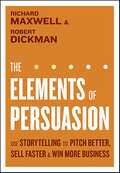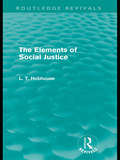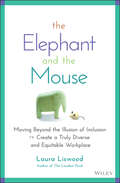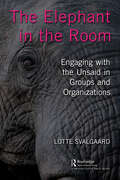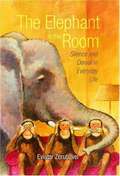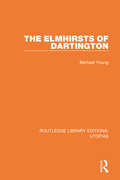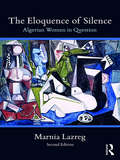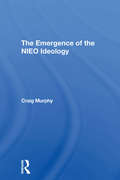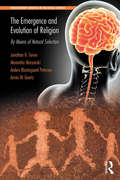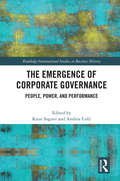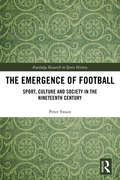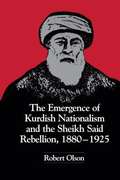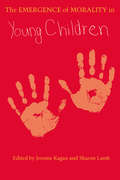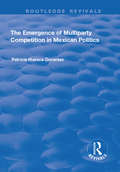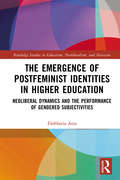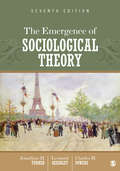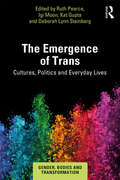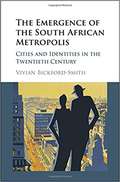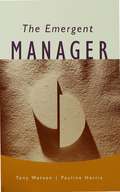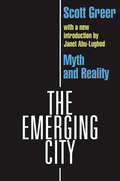- Table View
- List View
The Elements of Persuasion: Use Storytelling to Pitch Better, Sell Faster & Win More Business
by Richard Maxwell Robert Dickman"Every great leader is a great storyteller," says Harvard University psychologist Howard Gardner. According to master storytellers Richard Maxwell and Robert Dickman, storytelling is a lot like running. Everyone knows how to do it, but few of us ever break the four-minute mile. What separates the great runners from the rest? The greats know not only how to hit every stride, but how every muscle fits together in that stride so that no effort is wasted and their goals are achieved. World-class runners know how to run from the inside out. World-class leaders know how to tell a story from the inside out. In The Elements of Persuasion, Maxwell and Dickman teach you how to tell stories too. They show you how storytelling relates to every industry and how anyone can benefit from its power. Maxwell and Dickman use their experiences—both in the entertainment industry and as corporate consultants—to deliver a formula for winning stories. All successful stories have five basic components: the passion with which the story is told, a hero who leads us through the story and allows us to see it through his or her eyes, an antagonist or obstacle that the hero must overcome, a moment of awareness that allows the hero to prevail, and the transformation in the hero and in the world that naturally results.Let's face it: leading is a lot more fun than following. Even if you never want to be a CEO or to change the world, you do want to have control over your own work and your own ideas. Ultimately, that is what the power of storytelling can give you.
The Elements of Social Justice (Routledge Revivals)
by L. T. HobhouseFirst published in 1922, this title written by L. T. Hobhouse, British politician and one of the leading theorists of Social Liberalism, is a seminal work concerning the social application of ethical principles for the common good. The object of the book is to show that social and political institutions are not ends in themselves. Hobhouse argues that the social ideal is to be sought not in the faultless unchanging system of an institutional Utopia, but in the love of a spiritual life with its unfailing system of harmonious growth unconfined.
The Elephant and the Mouse: Moving Beyond the Illusion of Inclusion to Create a Truly Diverse and Equitable Workplace
by Laura A. LiswoodExplore diversity, equity, and inclusion that goes beyond unconscious bias and explores the ideas and tools needed to achieve these goals In The Elephant and the Mouse, award-winning speaker and diversity and inclusion expert Laura Liswood delivers a thought-provoking and insightful new business guide that explores workplace diversity and offers new ideas for gaining the real benefits from your diversity, equity, and inclusion initiatives. The Elephant and the Mouse refers to the dynamic in organizations that are roadblocks to consciously inclusive success. The Elephant, often dominant group leadership, knows little about the experiences of the Mouse, the non-dominant groups, while the Mouse knows so much more about the Elephant. In diverse workplaces, these two groups live in different worlds. Success will come only if everyone works in a true meritocracy. You learn what may be easy for some to do in their career is much harder for others to do. In this book, which builds upon Liswood's groundbreaking book, The Loudest Duck, you'll explore the powerful case for diversity, equity, and inclusion and the often-overlooked risks posed by a homogeneous workforce. You will learn the hard truths about why many DE&I efforts fail, millions of dollars are wasted, and why organizations confuse efforts with outcomes. You'll consider new ways of leading others, with a strong emphasis on tactics and strategies employed by successful Elephant and Mouse leaders, including women leaders. The book also includes: Realistic explanations for the slow progress in diversity, equity, inclusion and social justice in society and organizations Examinations of the concept and myths of meritocracy and how to conduct a Meritocracy Stress Test on your firm How organizations often have an illusion of inclusion but find their efforts not creating the inclusive, equitable teams they say they want How safety efforts can provide a roadmap for diversity missions An exploration of both the human interventions and non-human roles of technology in DE&I initiatives, including the use of people analytics to de-bias organizations What tools are needed to go beyond awareness of unconscious bias to de-bias processes and what traits the new Elephant and Mouse leader has An indispensable resource for managers, executives, and other business leaders who seek to recreate truly diverse, inclusive, and equitable organizations, The Elephant and the Mouse is also a must-read for human resources professionals, individuals who want successful careers in diverse teams, and anyone involved in the hiring, retaining, and promoting processes. This book offers a way to move beyond traditional diversity efforts towards more modern practices that embrace—and profit from—the differences between people.
The Elephant in the Room: Engaging with the Unsaid in Groups and Organizations
by Lotte SvalgaardA group is working on a business challenge. The group members are under pressure. They have a lot to accomplish and a limited amount of time. After first attempting to develop an overview of their common task, they try to make a plan to ensure an efficient group process. The planning is proving difficult. We’ve all been there. We are in a working group or at a meeting, discussing a topic or a challenge, and all the while, as a separate track running underneath our conversation, there is a subtext that no one explicitly addresses. This is an example of ‘the elephant in the room.’ Most of us notice the elephant, it gets in the way, and it’s difficult to deal with until someone points at it and says, ‘There it is, let’s take a look at it and reduce its impact.’ With an engaging use of examples and questions, the book addresses how we can best deal with the elephant and thus promote job satisfaction, creativity, and productivity. In the context of action, what we notice often recedes into the background and gradually slips out of focus until we eventually reconnect with our need to reflect and recreate a space for it. This book addresses the challenge of focusing on, holding on to, and acting on what we notice ‘in the middle of it all.’ Maintaining a simultaneous focus on task and process – what we do and what we notice – is what I define as ‘double awareness.’ Double awareness is not only a core capacity but also a core challenge. The aim of the book is to promote understanding and awareness of this core challenge and to inspire both reflection and action in anyone wishing to improve their capacity for double awareness. How can we define and understand the practice of mindful avoidance? And can we, as members of groups and organizations, begin to practice mindful action by engaging in and acting on what we notice, in real time?
The Elephant in the Room: Silence and Denial in Everyday Life
by Eviatar ZerubavelThe fable of the Emperor's New Clothes is a classic example of a conspiracy of silence, a situation where everyone refuses to acknowledge an obvious truth. But the denial of social realities--whether incest, alcoholism, corruption, or even genocide-is no fairy tale. In The Elephant in the Room, Eviatar Zerubavel sheds new light on the social and political underpinnings of silence and denial--the keeping of "open secrets." The author shows that conspiracies of silence exist at every level of society, ranging from small groups to large corporations, from personal friendships to politics. Zerubavel shows how such conspiracies evolve, illuminating the social pressures that cause people to deny what is right before their eyes. We see how each conspirator's denial is symbiotically complemented by the others', and we learn that silence is usually more intense when there are more people conspiring--and especially when there are significant power differences among them. He concludes by showing that the longer we ignore "elephants," the larger they loom in our minds, as each avoidance triggers an even greater spiral of denial. Drawing on examples from newspapers and comedy shows to novels, children's stories, and film, the book travels back and forth across different levels of social life, and from everyday moments to large-scale historical events. At its core, The Elephant in the Room helps us understand why we ignore truths that are known to all of us. "Eviatar Zerubavel gathers intriguing ideas for books the way ace foreign correspondents acquire great stories: by reflecting on the obvious, then probing as well as reporting."--The Philadelphia Inquirer
The Elmhirsts of Dartington: The Creation Of A Utopian Community (Routledge Library Editions: Utopias #6)
by Michael YoungDorothy and Leonard Elmhirst were the founders of Dartington - she the daughter of an American millionaire who was once Secretary to the US Navy; he the son of a Yorkshire parson and secretary to Rabindranath Tagore in Bengal before he married Dorothy. They were the twentieth century’s most substantial private patrons of architecture in England as well as of the arts and education. Dartington School was one of the most famous experimental schools in the world. Bertrand Russell sent his children there, as did Aldous Huxley and the Freuds. Dartington College of Arts and its associated Summer School of Music were equally famous in the world of the arts. Bernard Leach taught pottery, Mark Tobey painting, and Imogen Holst music. The Amadeus Quartet was formed there. Benjamin Britten and Peter Pears were frequent performers. In a setting of great beauty, school and college belonged to a general experiment in rural reconstruction. Dartington Glass was made in the Devonshire countryside and exported world-wide. So were Dartington Textiles, Dartington Furniture and Dartington Pottery. This book, originally published in 1982 (and reissued in 1996), describes how a unique combination of education, arts, industry and agriculture came to be put together. The result was one of the hardiest Utopian communities of modern times. It eventually overcame the strong local opposition to such a daring undertaking. The author finds the origins of modern Dartington in the founders’ hopes that mankind would be liberated through education; that a new flowering of the arts would transform a society impoverished by industrialisation and secularisation; and that a society seeking to draw together town and country would combine the best of both worlds. This book is an extraordinary memoir of two people and the place they made.
The Eloquence of Silence: Algerian Women in Question
by Marnia LazregThe Eloquence of Silence, first published in 1994, is considered a seminal text in the scholarship of women and North Africa. Marnia Lazreg makes a critical departure from more traditional studies of Algerian women, which usually examine female roles in relation to Islam – and instead takes an interdisciplinary approach, arguing that Algerian women's roles are shaped by a variety of structural and symbolic factors. These include colonial domination, demographic change, nationalism, family formation, the turn to culturalism, and the progressive shift to a capitalist economy. Grounded in archival research supplemented by interviews, and adopting a historico-critical method, the book identifies and examines the significance of an enduring feature of women’s journey: their instrumental use as tropes in struggles between groups of men opposed to one another during political crises. It demonstrates that despite being central to contentious political issues, women’s needs and aspirations were obscured just as their voices have traditionally been silenced. This new edition is thoroughly updated throughout to connect the original material to major political disruptions in the twenty-first century, such as the 9/11 attacks on New York and events around the "Arab Spring." The book foregrounds women’s determination to forge ahead, as well as their activism, which led to progress in fighting rape and other forms of violence made banal in the wake of the civil war (1992–2002). It also calls for a "decolonization" of concepts and theoretical systems used in accounting for women’s lived reality, and a questioning of facile postfeminist discourses in their manifold expressions.
The Embarrassment of Being Human: A Critical Essay on the New Materialisms and Modernity in an Age of Crisis
by Benjamin BoysenWith the message that everything in a sense is alive, thus allowing us to join forces with new politico-ethical communities stretching across human and nonhuman realms, the new materialisms have captivated the minds of many academics, artists, and intellectuals by stressing that it is time to return to a premodern mindset and discard modernity and its concepts of secularization, autonomy, and finitude.The Embarrassment of Being Human not only demonstrates how these magical materialisms are beset by grave theoretical and practical inconsistencies and self-contradictions. It also demonstrates how their demand for humans to step down and allow for an emancipation of things qualifies the new materialisms as a metaphysics of neoliberalism that reproduces and fortifies the self-contradictions rampant in the current neoliberal hegemony.While helping us to gain a comprehensive understanding of the tenets of the eerie ills of our epoch, the critique of the new materialisms can furthermore inspire us to appreciate how the exact inversion of the new materialist complex amounts to a revitalization of the modern project. A revitalization that is critical to think our epoch differently.
The Embarrassment of Riches: An Interpretation of Dutch Culture in the Golden Age
by Simon SchamaIn a brilliantly inventive work, bestselling author Simon Schama explores the enigma of 17th-century Holland, a nation that attained an unprecedented level of affluence, yet lived in constant dread of being corrupted by prosperity.
The Emergence Of The Nieo Ideology
by Craig MurphyThis study traces the political history of the ideas underlying Third World calls for a New International Economic Order. Filling a significant gap in the literature, the book shows that NIEO ideology has a direct, unbroken line of development extending back to World War II, when a "new international economic order," the Bretton Woods system, was created. Dr. Murphy maintains that NIEO ideology is not rooted only in Third World acceptance of Prebisch's views on trade; rather, it evolved from Third World attempts to cope with problems and opportunities that emerged as the Bretton Woods system was created, operated, and began to break down. By the 1970s, the ideology had become a complex and coherent analysis of the economic position of Third World states, including a political analysis of how Third World views could be made dominant. Many of Dr. Murphy's conclusions challenge the conventional wisdom about the Third World position of the NIEO. In addition, his study offers insight into the relatively unexplored area of how changes in political and social consciousness affect international systems, and provides grounds on which officials from both the South and the North can see the others' views as less alien.
The Emergence and Evolution of Religion: By Means of Natural Selection (Evolutionary Analysis in the Social Sciences)
by Jonathan H. Turner Alexandra Maryanski Anders Klostergaard Petersen Armin W. GeertzWritten by leading theorists and empirical researchers, this book presents new ways of addressing the old question: Why did religion first emerge and then continue to evolve in all human societies? The authors of the book—each with a different background across the social sciences and humanities—assimilate conceptual leads and empirical findings from anthropology, evolutionary biology, evolutionary sociology, neurology, primate behavioral studies, explanations of human interaction and group dynamics, and a wide range of religious scholarship to construct a deeper and more powerful explanation of the origins and subsequent evolutionary development of religions than can currently be found in what is now vast literature. While explaining religion has been a central question in many disciplines for a long time, this book draws upon a much wider array of literature to develop a robust and cross-disciplinary analysis of religion. The book remains true to its subtitle by emphasizing an array of both biological and sociocultural forms of selection dynamics that are fundamental to explaining religion as a universal institution in human societies. In addition to Darwinian selection, which can explain the biology and neurology of religion, the book outlines a set of four additional types of sociocultural natural selection that can fill out the explanation of why religion first emerged as an institutional system in human societies, and why it has continued to evolve over the last 300,000 years of societal evolution. These sociocultural forms of natural selection are labeled by the names of the early sociologists who first emphasized them, and they can be seen as a necessary supplement to the type of natural selection theorized by Charles Darwin. Explanations of religion that remain in the shadow cast by Darwin’s great insights will, it is argued, remain narrow and incomplete when explaining a robust sociocultural phenomenon like religion.
The Emergence of Corporate Governance: People, Power and Performance (Routledge International Studies in Business History)
by Knut SognerCorporate governance is not just about models of best practice organisation or prescriptions following laws or social conventions. Corporate governance is also about persons of power seeking performance, and they do so in ways that transcend structures and pre-conceived notions of the structural set-up of the business. This book emphasises the decision-making dimensions of corporate governance, placing it right in the messy middle of the ever-changing world of capitalism, focussing on the interplay between professional managers and shareholders. This book aims to bring together several fresh perspectives on the development of capitalism seen through the lens of corporate governance. It illustrates the role of intentionality and persons, both as a method with which to understand processes of change, but also as a principle with which to seek a deeper understanding of the corporate governance choices made. It will be of interest to researchers, academics and students in the fields of corporate governance and entrepreneurship, as well as practitioners and other audience interested in the evolution of capitalism and corporate culture.
The Emergence of Football: Sport, Culture and Society in the Nineteenth Century (Routledge Research in Sports History)
by Peter SwainThe Emergence of Football fuses sports history into mainstream economic, social and cultural history, setting the development of the people’s game against the backdrop of the Industrial Revolution. The book challenges conventional histories of nineteenth-century football that surrounded mass games and the public schools and extends the revisionist critique of those histories with the imaginative use of new and original empirical evidence. It outlines the continuing presence of a working-class footballing culture across the century, arguing that the structure of football was a product of industrialisation, urbanisation and population growth that had resulted in a far-reaching restructuring of the class system and urban hierarchies. It was these new hierarchies and class system that gave birth to professional football by the late 1870s. It is essential reading for students of sports studies, economic, social and cultural history, urban and local history, and sociology, as well as a valuable resource for scholars and academics involved in the study of football across the world. This is an absorbing and fascinating read for any of the millions of fans of the game who are interested in the early history of football.
The Emergence of Kurdish Nationalism and the Sheikh Said Rebellion, 1880-1925
by Robert OlsonThis is the first work in any Western language dealing with the development of Kurdish nationalism during this period and is supported with documentation not previously utilized, principally from the Public Record Office in Great Britain. In addition, the author provides much new material on Turkish, Armenian, Iranian, and Arab history and new insights into Turkish-Armenian relations during the most crucial era of the history of these two peoples.
The Emergence of Morality in Young Children
by Jerome Kagan Sharon Lamb"The Emergence of Morality in Young Children is one of very few scholarly books concerning the development of moral tendencies in the early years. In its pages, a diverse group of eminent social and behavioral scientists address this fascinating topic and struggle with issues of inquiry that have persistently plagued this field."—Nancy Eisenberg, Harvard Educational Review <P><P> "This is a welcome and immensely provocative book. For those of us who favor ethical theorizing done in close proximity to psychology and anthropology, it provides new and illuminating theory and research relevant to perennial debates about the origins of moral sense, its psychological organization, and the objectivity and unity of the moral."—Owen Flanagan, Ethics <P><P> The contributors are Augusto Blasi, Lawrence Blum, Judy Dunn, M. Ann Easterbrooks, Carolyn Pope Edwards, Robert Emde, Carol Gilligan, Charles C. Helwig, William F. Johnson, Jerome Kagan, Melanie Killen, Sharon Lamb, Manamohan Mahapatra, Joan G. Miller, Edward Mueller, Richard A. Shweder, Catherine Snow, Elliot Turiel, and Grant Wiggins.
The Emergence of Multiparty Competition in Mexican Politics (Routledge Revivals Ser.)
by Patricia Huesca-DorantesThis title was first published in 2003. Mexico's presidential election in 2000 marked the end of 71 years of one-party rule, after a slow process of emergence of democratic institutions and viable second-party candidates. Yet the process of democratization has been uneven, proceeding much more rapidly in some regions than in others. This book examines whether diffusion processes have been at work or whether broader national processes of change have unfolded across an uneven socio-economic map. Using new methods of spatial econometrics, it explores how multi-party politics have emerged in a single country, testing both spatial diffusion and political development theories. Mexico makes an interesting study - with its contrasting borders, different kinds of geography, and levels of industrialisation and development, it involves a wide range of variables as well as socio-economic aspects of the population that display sharp regional differentiation.
The Emergence of Neuroscience and the German Novel: Poetics of the Brain (Palgrave Studies in Literature, Science and Medicine)
by Sonja BoosThe Emergence of Neuroscience and the German Novel: Poetics of the Brain revises the dominant narrative about the distinctive psychological inwardness and introspective depth of the German novel by reinterpreting the novel’s development from the perspective of the nascent discipline of neuroscience, the emergence of which is coterminous with the rise of the novel form. In particular, it asks how the novel’s formal properties—stylistic, narrative, rhetorical, and figurative—correlate with the formation of a neuroscientific discourse, and how the former may have assisted, disrupted, and/or intensified the medical articulation of neurological concepts. This study poses the question: how does this rapidly evolving field emerge in the context of nineteenth century cultural practices and what were the conditions for its emergence in the German-speaking world specifically? Where did neuroscience begin and how did it broaden in scope? And most crucially, to what degree does it owe its existence to literature?
The Emergence of Organizations and Markets
by Walter W. Powell John F. PadgettA dynamic framework for studying social emergenceThe social sciences have sophisticated models of choice and equilibrium but little understanding of the emergence of novelty. Where do new alternatives, new organizational forms, and new types of people come from? Combining biochemical insights about the origin of life with innovative and historically oriented social network analyses, John Padgett and Walter Powell develop a theory about the emergence of organizational, market, and biographical novelty from the coevolution of multiple social networks. They demonstrate that novelty arises from spillovers across intertwined networks in different domains. In the short run actors make relations, but in the long run relations make actors.This theory of novelty emerging from intersecting production and biographical flows is developed through formal deductive modeling and through a wide range of original historical case studies. Padgett and Powell build on the biochemical concept of autocatalysis—the chemical definition of life—and then extend this autocatalytic reasoning to social processes of production and communication. Padgett and Powell, along with other colleagues, analyze a very wide range of cases of emergence. They look at the emergence of organizational novelty in early capitalism and state formation; they examine the transformation of communism; and they analyze with detailed network data contemporary science-based capitalism: the biotechnology industry, regional high-tech clusters, and the open source community.
The Emergence of Postfeminist Identities in Higher Education: Neoliberal Dynamics and the Performance of Gendered Subjectivities (Routledge Studies in Education, Neoliberalism, and Marxism)
by Eleftheria AttaBy drawing on qualitative research conducted in universities in Cyprus, this book presents an account of life in the academy from a feminist perspective. In doing so, the texts uncover new gendered identities emerging as a result of neoliberal and postfeminist discourses in Higher Education. Adopting a psychosocial lens, and drawing on theories of affect and performativity, this volume explains academics’ responses to growing levels of stress, anxiety, precarity and competition in their professional environment. Chapters offer rich observation of how academic staff and faculty negotiate aspects of femininity and masculinity within the academy, and so highlights the performance of ‘gendered academic subjectivities’ as a way in which academics deal with increasing pressures and anxiety. Ultimately proposing a typography of emergent, affective identities including industry academics, fossilised, family and wannabe academics, the volume yields important insights into the current workings of Higher Education and shows the personal and professional impacts of neoliberal dynamics. This volume will prove to be a useful resource for researchers and high-level scholars in the fields of education, sociology of education and gender studies. More generally, scholars and academics with an interest in the changing face of contemporary Higher Education will find this book informative.
The Emergence of Sociological Theory
by Jonathan H. Turner Leonard Beeghley Dr Charles H. PowersNow published by SAGE, this scholarly text covers the first one hundred years of sociological theorizing, from 1830-1930, focusing primarily on Comte, Spencer, Marx, Weber, Simmel, Durkheim, and Mead. The text provides an in-depth examination of these early sociological theorists with biographical background, analysis of key works, major influences, critical insights, and also answers the question, "What do these ideas tell us about the basic forces that shape the social world?" Posing this question for each theorist adds a unique perspective to the text and distinguishes it from other sociological theory books. In addition, it also includes material on the enduring models and principles of the theorists' work that continue to inform sociological theory today.
The Emergence of Trans: Cultures, Politics and Everyday Lives (Gender, Bodies and Transformation)
This book represents the vanguard of new work in the rapidly growing arena of Trans Studies. Thematically organised, it brings together studies from an international, cross-disciplinary range of contributors to address a range of questions pertinent to the emergence of trans lives and discourses. Examining the ways in which the emergence of trans challenges, develops and extends understandings of gender and reconfigures everyday lives, it asks how trans lives and discourses articulate and contest with issues of rights, education and popular common-sense. With attention to the question of how trans has shaped and been shaped by new modes of social action and networking, The Emergence of Trans also explores what the proliferation of trans representation across multiple media forms and public discourse suggests about the wider cultural moment, and considers the challenges presented for health care, social policy, gender and sexuality theory, and everyday articulations of identity. As such, it will appeal to scholars and students of gender and sexuality studies, as well as activists, professionals and individuals interested in trans lives and discourses.
The Emergence of the South African Metropolis
by Vivian Bickford-SmithFocusing on South Africa's three main cities - Johannesburg, Cape Town, and Durban - this book explores South African urban history from the late nineteenth century onwards. In particular, it examines the metropolitan perceptions and experiences of both black and white South Africans, as well as those of visitors, especially visitors from Britain and North America. Drawing on a rich array of city histories, travel writing, novels, films, newspapers, radio and television programs, and oral histories, Vivian Bickford-Smith focuses on the consequences of the depictions of the South African metropolis and the 'slums' they contained, and especially on how senses of urban belonging and geography helped create and reinforce South African ethnicities and nationalisms. This ambitious and pioneering account, spanning more than a century, will be welcomed by scholars and students of African history, urban history, and historical geography.
The Emergence of the Welfare State in Britain and Germany: 1850-1950 (Routledge Library Editions: Welfare and the State #15)
by W. J. MommsenOriginally published in 1981 The Emergence of the Welfare State in Britain and Germany 1850-1950 is an edited collection on the history and future prospects of the modern welfare state. It attempts to pave the way for an analysis of the problems of the welfare state and its historical origins, and the likely future that transcends the nation-state orientated historical accounts. This collection of essays seeks to promote an interdisciplinary approach to the problems of the welfare state in two industrial societies. So far historians and social scientists concerned with this field of research have tended to work in isolation from one another, without mutual exchange of knowledge and using different methods. This book attempts to give equal scope to both perspectives.
The Emergent Manager
by Pauline Harris Tony J. WatsonThe Emergent Manager examines the process of becoming a manager within organizations and considers how people relate the ways in which they 'manage' their lives to their development as managers in the workplace. At the heart of the book is the idea of the individual engaged in a continual process of 'becoming'. Focusing on the reported experiences of managers, the book is richly illustrated throughout with examples drawn from a variety of workplaces, including the civil service, academia, the retail industry, construction and engineering, banking and the prison service. Tony Watson and Pauline Harris together provide a new understanding of the nature of the management role and the ways in which people make sense of their lives as managers. Accessible and innovative, this book will be of interest to students and academics in management and organization studies as well as practising managers.
The Emerging City: Myth and Reality
by Scott GreerThe Emerging City was written at a time when the great transformation from urban to suburban lifestyle was under way. It is a tribute to Scott Greer that his work understood the new contours of the city, and also well appreciated that far from spelling the end of urban life, the new developments in communication and transportation only served to change the social and political structure of modern societies. Greer established the principle that in urban affairs, public policy follows the market. The task of this fine work was to chart just how this flow took place.A careful researcher and writer, Scott Greer herein poses the largest questions of urban existence: What needs for fellowship and freedom are bedrock? What is gained and what is lost as urbanization unfolds? Can one speak of certain urban arrangements as good or bad for humans? The Emerging City attempts a theory of society within which the changing city could be interpreted at the social, political, and symbolic levels. The modern city is no longer an autonomous unit, but very much a part of, often at the center of, national and even international developments. As Janet Abu-Lughod points out in her sharp introduction most of the themes that are now in common usage owe their beginnings to Scott Greer.
